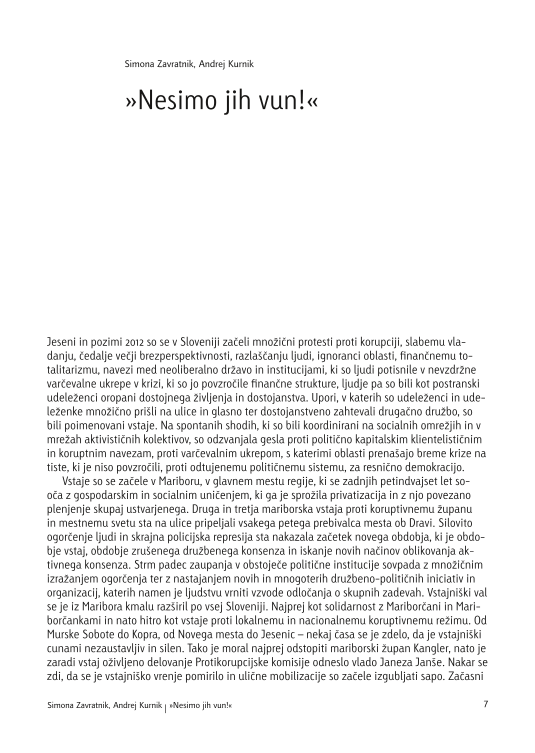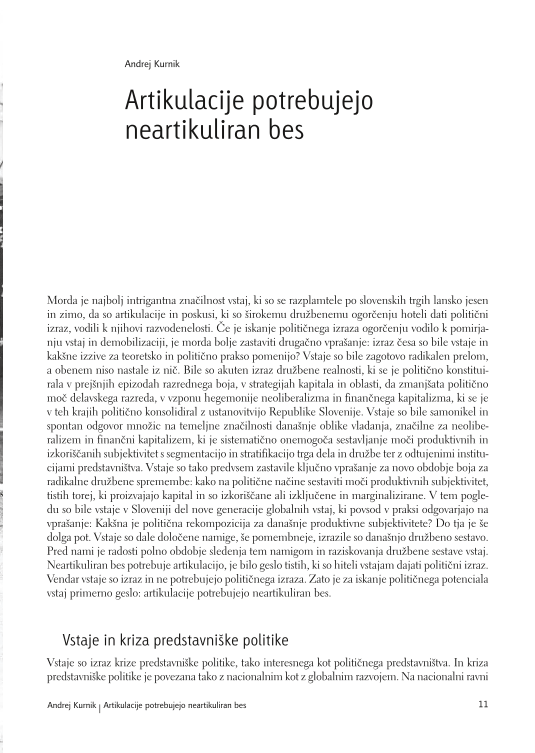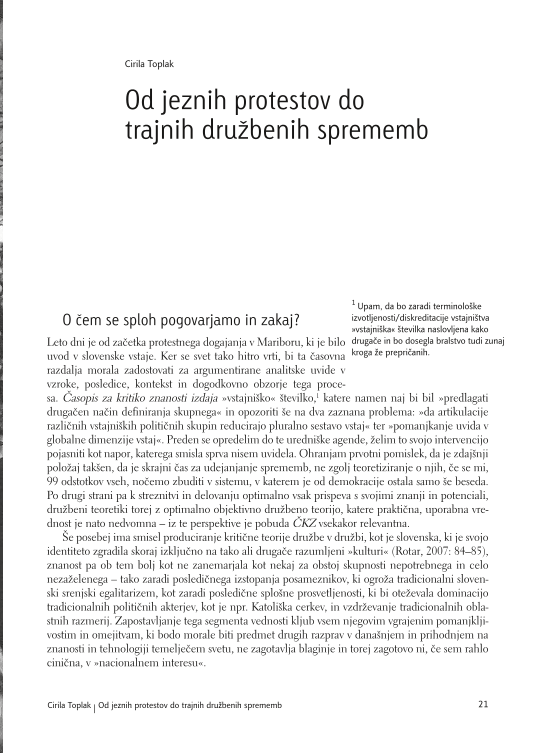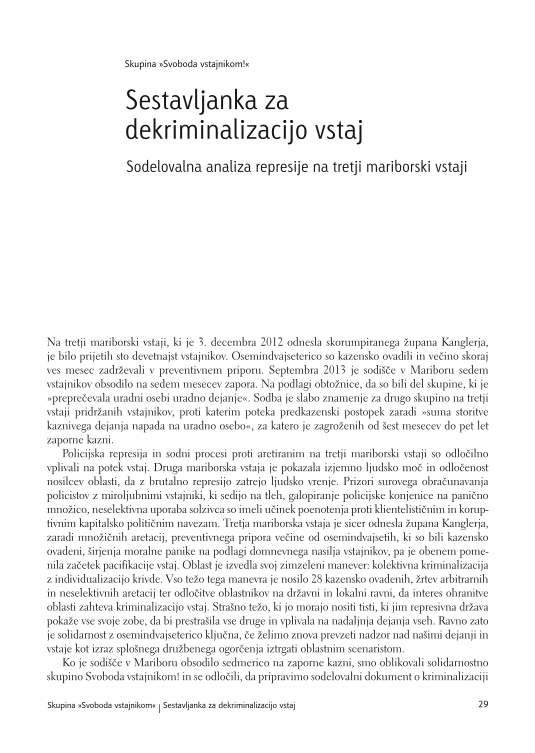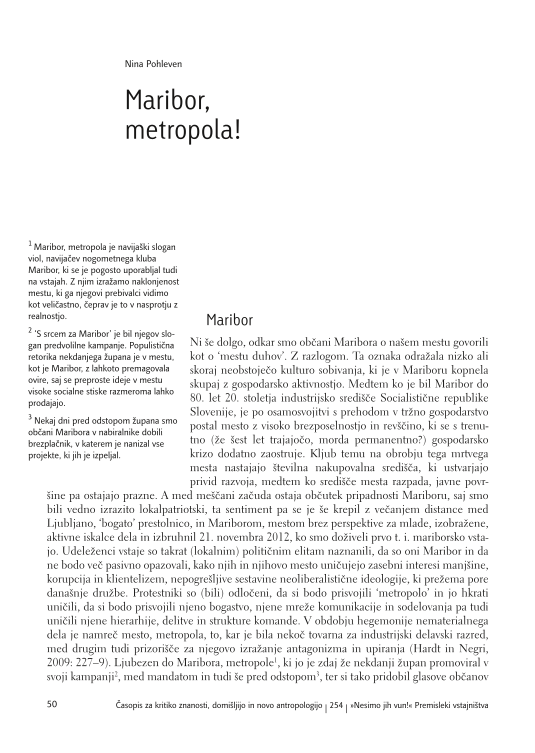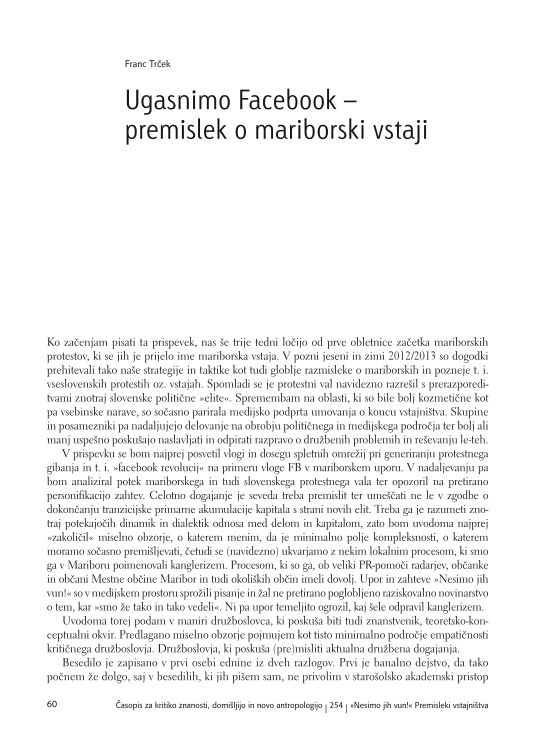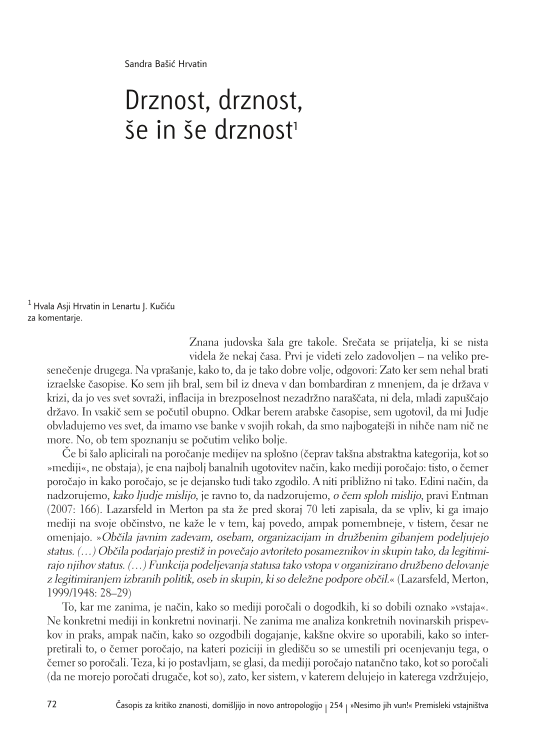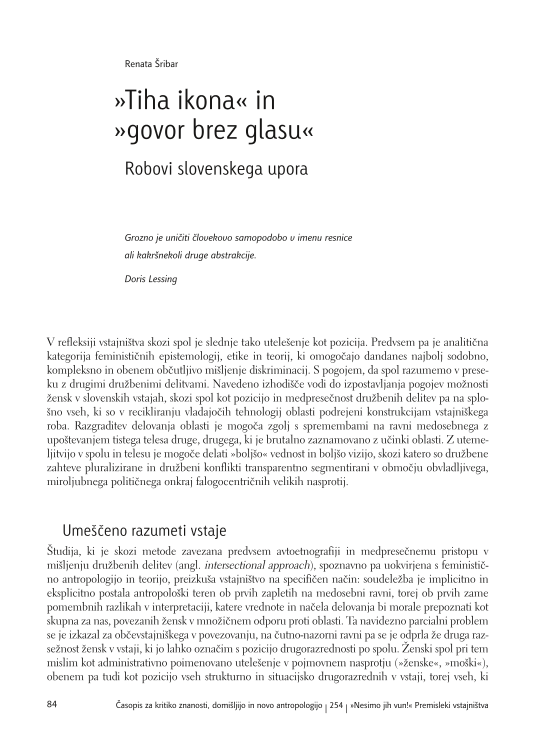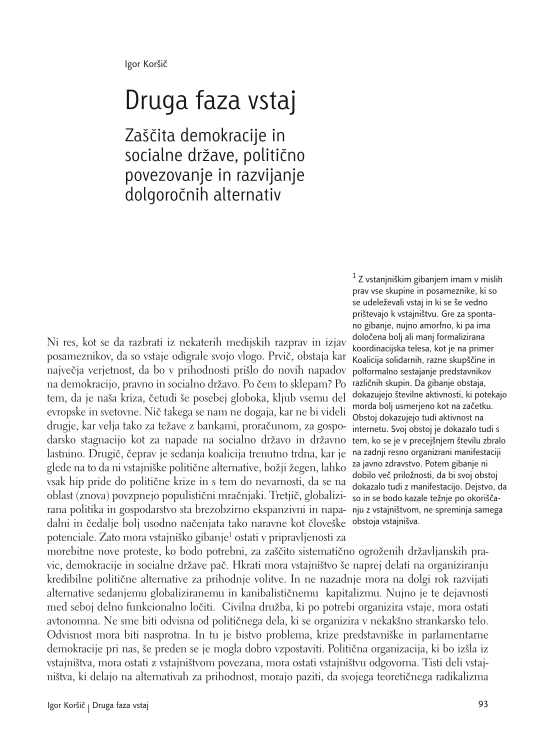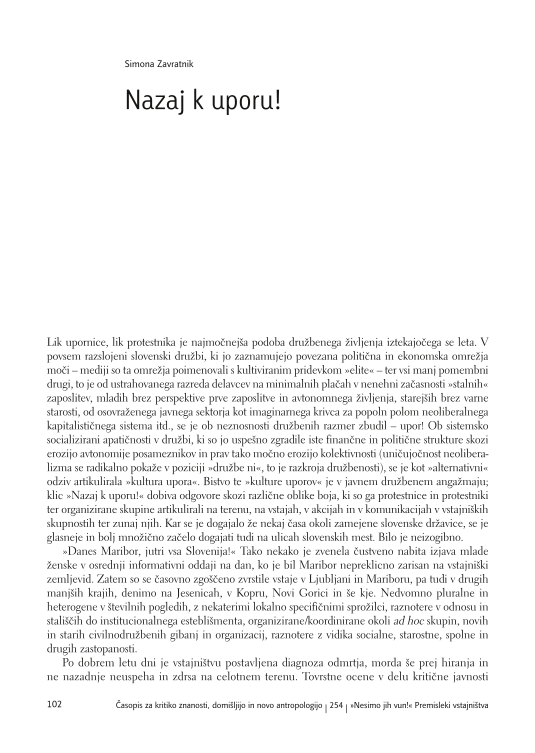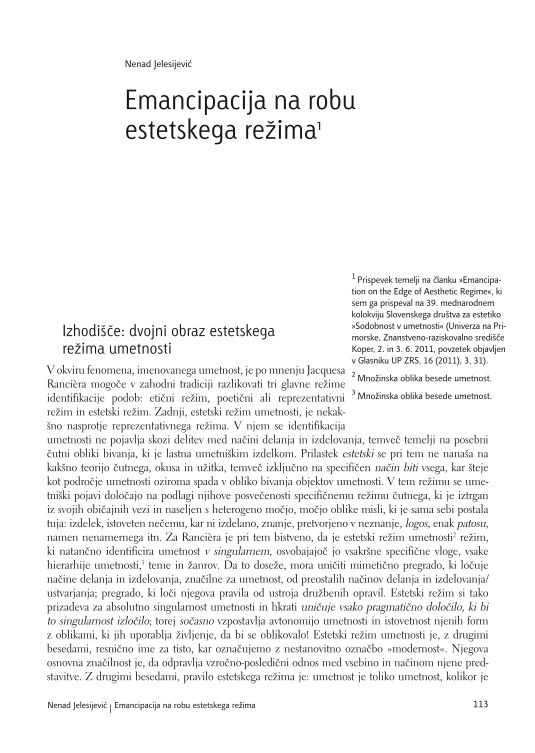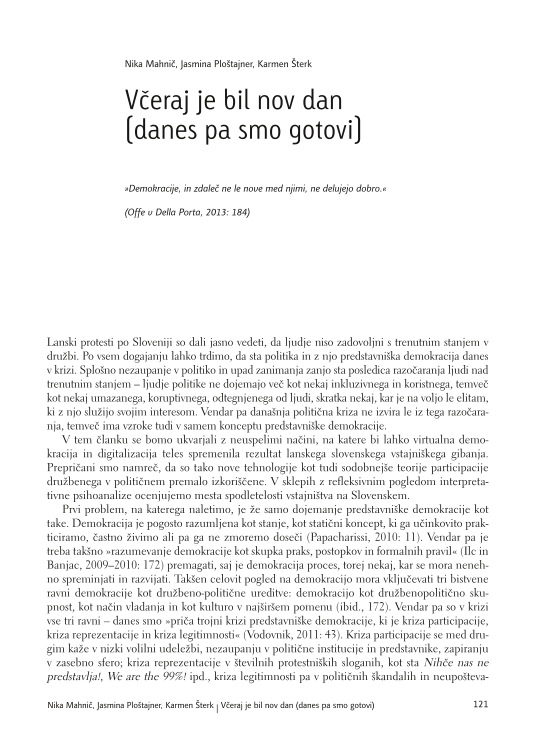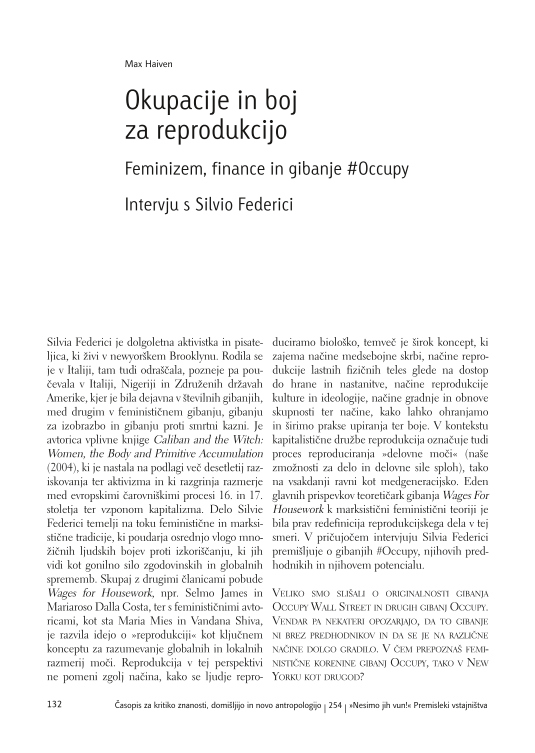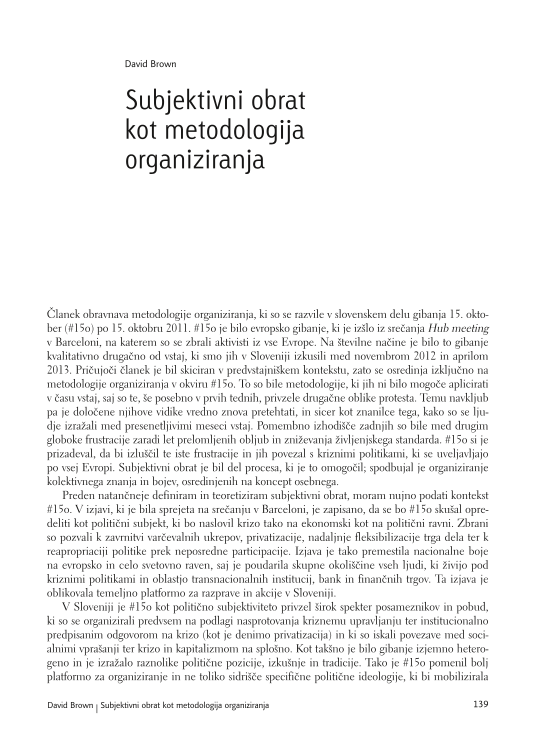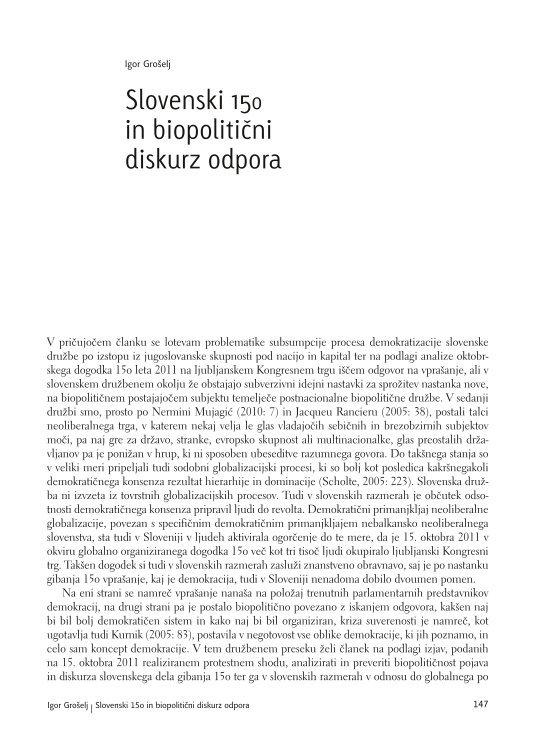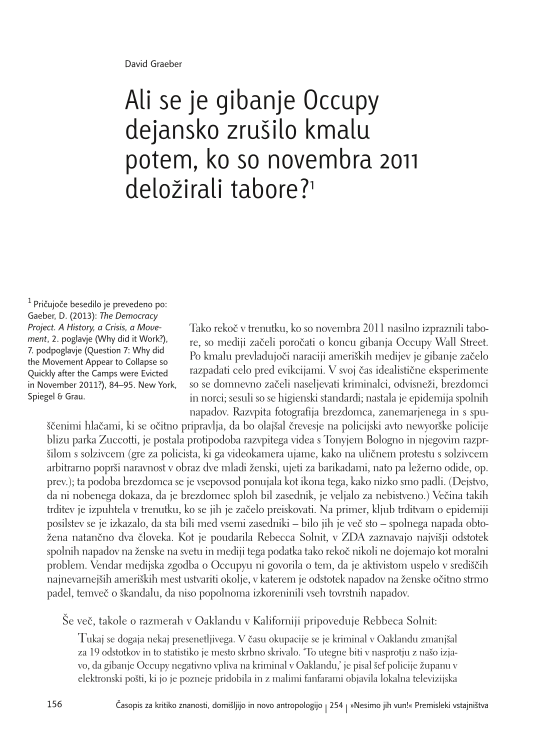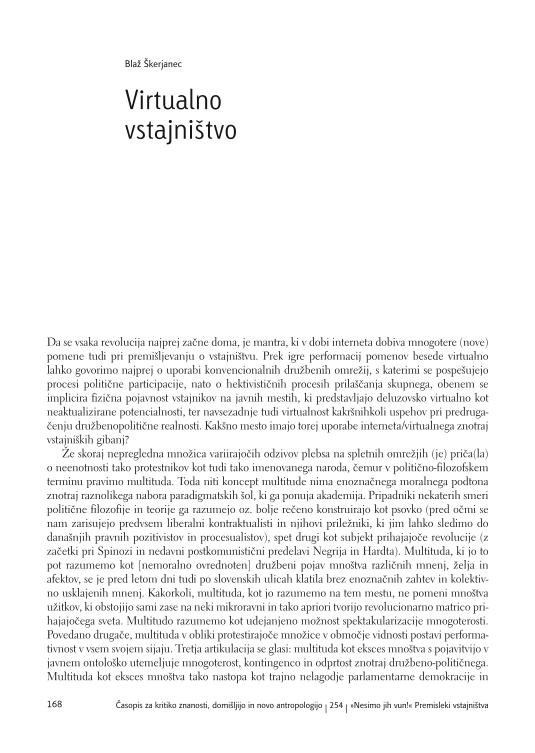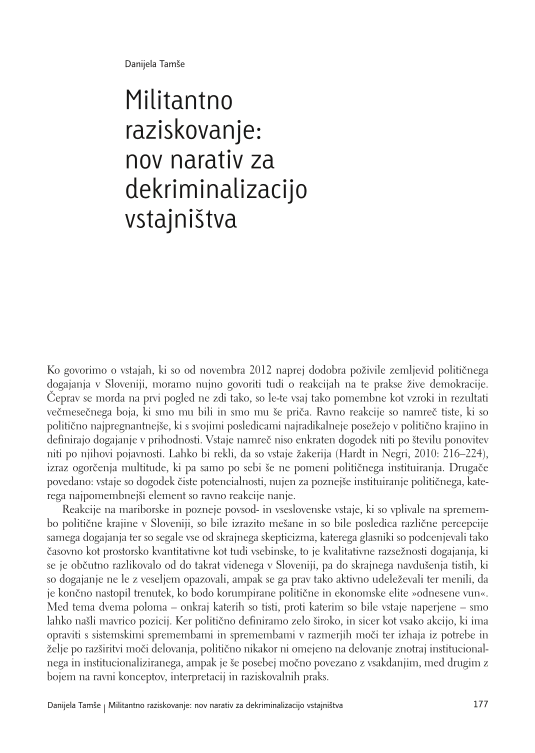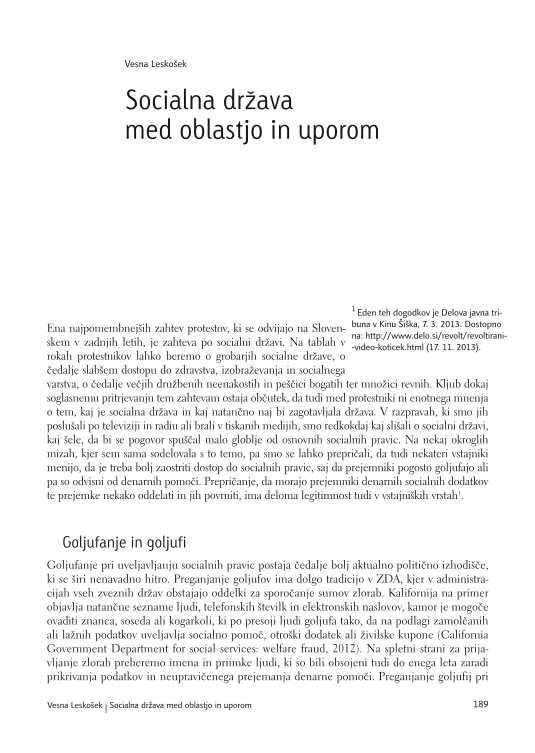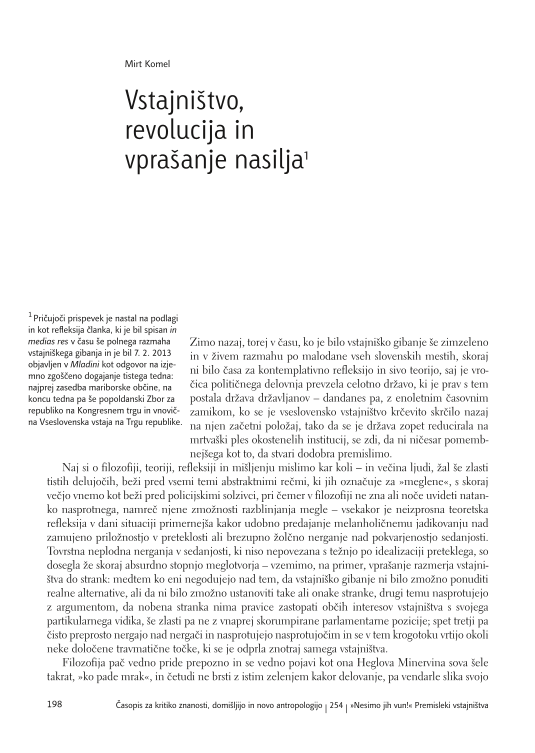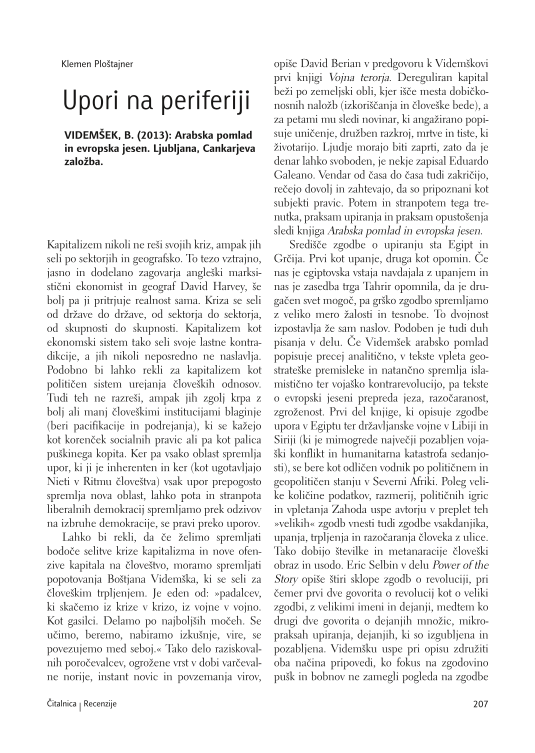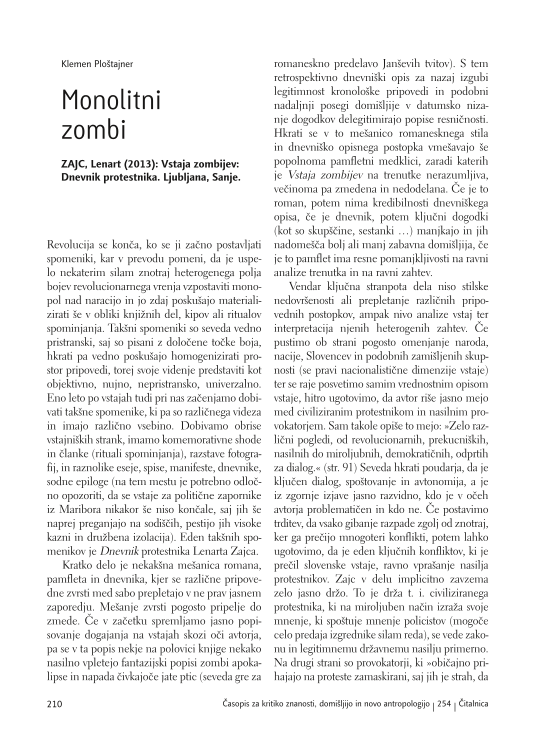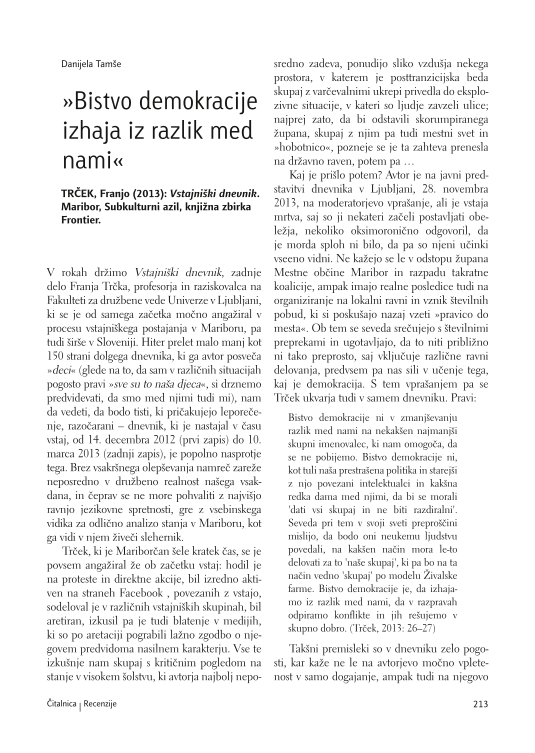Jeseni in pozimi 2012 so se v Sloveniji začeli množični protesti proti korupciji, slabemu vladanju, čedalje večji brezperspektivnosti, razlaščanju ljudi, ignoranci oblasti, finančnemu totalitarizmu, navezi med neoliberalno državo in institucijami, ki so ljudi potisnile v nevzdržne varčevalne ukrepe v krizi, ki so jo povzročile finančne strukture, ljudje pa so bili kot postranski udeleženci oropani dostojnega življenja in dostojanstva. Upori, v katerih so udeleženci in udeleženke množično prišli na ulice in glasno ter dostojanstveno zahtevali drugačno družbo, so bili poimenovani vstaje. Na spontanih shodih, ki so bili koordinirani na socialnih omrežjih in v mrežah aktivističnih kolektivov, so odzvanjala gesla proti politično kapitalskim klientelističnim in koruptnim navezam, proti varčevalnim ukrepom, s katerimi oblasti prenašajo breme krize na tiste, ki je niso povzročili, proti odtujenemu političnemu sistemu, za resnično demokracijo.
Uprisings are an expression of the crisis and inadequacy of interest and political representation. This crisis has national and global genealogy. National genealogy is related to the tradition of corporatism, and global to the hegemony of neoliberalism and financial capitalism. With financial crises, contradictions of such representation explode. The crisis of representation was foreseen even before massive uprisings—in micro uprisings. For a certain period, one could follow labor and social struggles that surpassed channels of interest and political representation. Those struggles already addressed the question that has become central in massive uprisings: how to define the common based on heterogeneity and multiplicity of the present labor and society.
The present article presents founded analytical insights into causes, consequences, contexts and the time horizon of protests in Slovenia, in particular in Maribor, with a one-year time distance. It provides arguments for the interpretation of certain elements of these processes by means of analytical tools of political theory and the historical comparative method. The article considers in particular the findings that may represent directives for future anti-systemic political activism, founded on political innovations and not so much on variations and upgrades of the existing paradigmatic social concepts.
Following the third uprising in Maribor (2012), the authorities responded with a mass incarceration of and legal proceedings for 28 protesters. They were remanded into preventive custody for a month as a warning to other protestors. Following the sentencing of seven protesters, the Freedom of Uprisers! Group was founded, and it made analyses of repression and criminalization of uprisings on the basis of interviews with the criminalized protestors. The analysis does not provide definite answers, but—by organizing the knowledge—rather opens numerous issues that call for collective answers to these questions: How can a formal democracy introduce a state of emergency? How did the criminalization of uprisings become an expression of a systematic spin of a social riot into crime news? How to resist repression and systematic violence? Thus, by arranging small, severed pieces of lives of the penalized uprisers and smashed parts of our society, the group Freedom for Uprisers! is searching for answers to these questions.
On 21 November 2012, the first uprising took place in Maribor, and it shocked the Slovenian public because of the sudden explosion of anger in a city otherwise called ‘the city of ghosts’. This name reflects the city’s high unemployment rate, poverty, and abandoned public places. However, the motive for the uprising were actually the radar traps that Mayor Kangler set up in the streets and because of which he was finally ousted from his post. His ousting was followed by a debate about the future of Maribor between various civil initiatives that arose during the demonstrations. The article tries to describe the events in Maribor before and during the riots, as well as the activities held by civil initiatives. It then interweaves this description with the reflection on the theories of the Zapatistas and piqueteros as two ‘scholarly cases’ of the new social movements. In addition, the article looks at the similarities and especially at the differences between the Zapatistas and piqueteros and the movement in Maribor as it seeks to find out whether ‘the risen Maribor’ surpassed the division between the movements from periphery and from the center, which is introduced in the text. It turns out that—despite the changes that global economic crisis brought to the world order—our passive bodies from the neoliberal center are still unable to create social realities that would allow us to live beyond the neoliberal practices.
The text first examines the role and reach of social networks in generating a protest movement. The author analyzes the disadvantages and advantages of the so-called Facebook revolution through the case study of a Facebook group Franc Kangler should resign as mayor of Maribor/Franc Kangler naj odstopi kot župan Maribora. What follows is a critical analysis of the course of the wave of protests that recently took over Maribor and Slovenia. Here, the author points out the problem of over-personification of those held responsible for the political and development problems, and the fact that local intellectuals proved not being up to the challenges of the uprising. The latter is evident from the excessive “culturization” of the uprising, and the gap that soon divided the intellectuals from the protesting crowd. Furthermore, it is crucial to reflect upon the whole process, placing it into a context broader than that of the stories about the collapsed elites’ completion of transitional primary capital accumulation. It is necessary to examine it within the current dynamics and dialectics of the relationship between labor and capital. Therefore, the horizon of thought set out in the introduction lies within a minimal field of complexity, always in need of conterminous reflection, even when (seemingly) dealing with a certain local process, termed by the inhabitants of Maribor as kanglerism.
The author analyzes the media reporting on how the events were tangled into the whole story, framed and interpreted, and on the positions and points of view taken when reporting the events. The hypothesis is that the media report in the way they do because the system within which they operate, and which they sustain, allows only precisely determined framings of the story and these invariably support and legitimize the existing social order. In the second part, the author tries to explain why the “uprisers” stayed on the level of “political revolution” rather than attempting the economic revolution as well (both notions are borrowed from Rosa Luxemburg). Why the majority of the uprising groups sought to attract media attention and acquiesced to their “flattering” while not demanding the radical reform of the media (space) as well? Can any uprising, any rebellion movement or a revolution succeed without rebellious media? The answer is no. Moreover, it is possible to say that the outcome of the future political struggle will depend on whether the states will choose to serve the interests of citizens or of the capital. Equally importantly, it is necessary to distinguish between capitalism and democracy in this struggle. The key question we face is very simple: should we strive to rescue capitalism or democracy? Rescuing both is impossible.
The paper addresses the Slovenian uprisings by way of auto-ethnography, with a focus on the interpersonal level, accentuating the fact of complex, intersected social divisions. The basic concept, the body/corporeality is adopted from the feminist theory. Through this and the thinking of the social positionality, the margin of the Slovenian resistance is figuratively articulated by the author with a quiet presence of the disintegrated “subject”— and by the silence as a gesture of the resistance against the uprisings’ power relations. The technology of the latter recycles the ruling authorities’ “governmentality” (Foucault). The Slovenian uprisings’ manifested symptoms of this are differentiated, yet paradigmatic, a key element of the paradigm being the secrecy with which the dominant instances form the circuit of the informed– involved and the uninformed, excluded and instrumentalized for the implementation of the (certain) tasks. The focus on the recognition of the other, who is embodied in the mutual intersections of the social divisions, allows for the agency on the platform of the interpersonal and differentiation, which produces the multiplication of the socio-political demands—on the way to radicalized , pluralized, agonistic democracy (Mouffe).
The paper aims to determine what the uprising movement in Slovenia should be doing in the future. It starts with analyses of the present economic and political situation in Slovenia, EU and the world. The rough analyses, based on the expertise of Paul Krugman and Catherine Samary on the pressures on Slovenia and France, show that the economic situation in both countries is far from being as poor as markets, EU officials, the specialized media, and rating agencies are suggesting. From this, one can draw a conclusion that a balanced budget is not the real objective of austerity policies. The real aim seems to be rather the devastation of the social safety nets, making poorer citizens pay for the crises and forcing the states into privatization, selling the state property at a low price. It is also clear that Angela Merkel’s austerity policy does not work. To the contrary, this policy is sustaining the current economic crisis in the EU and the world. The task of the uprising movement is to stay alert for future actions, to safeguard the interests of the citizenry, to mold itself into a credible political force and to work for sustainable economic and political system for the future. It is vital that the uprising movement stay pragmatic and visionary at the same time, and avoid the danger of rigid doctrines.
The article presents reflections on uprising practices and the “uprising culture” which spread across Slovenia in late 2012. It focuses on two sets of aspects: one is the positioning of local manifestations within the global matrix of uprisings, analyzed through actions of solidarity and networking with Turkish activists, mostly students in Ljubljana (the example of activation through the “Occupy Gezi – Ljubljana” movement). The second focuses on essential emphases and missing elements, i.e., centralized core contents of the uprisings, and fringe uprisings, for instance the “Protest From Despair” and solidarity with the Maribor foundry workers. New crystallization points of the uprisings are likely to develop in the field of social and labor rights, and these constitute the central “new” battlefield of social inequality, poverty and survival. “Rise again!” is thus the call of the nowadays-precarious worker, who can lose his job, home, and social security at any time.
The aesthetic regime of art, following J. Rancière, is not proclaiming revolution, but rather a new way of living between words, images and commodities. Starting the paper from the premise that that regime has a double face, I try to highlight the question of its (anti)revolutionary potential. Accordingly, I cannot avoid ascribing altered meanings to the term aesthetic, following the altered understanding of the very phenomenon/problem called art. In that regard, I comment on four examples of consensual and disensual artistic practices that aspire to be activist ones. The conclusion resulting from the comparative analysis is that the aesthetics of direct action is the aesthetics that escapes any outlined rule, being at the same time limited in time and space; it is valid in a certain moment, in a certain place, in a certain performative, rebellious context. The aesthetic of an emancipatory art practice—which is something else than art—is reconfigured aesthetic.
The article discusses the reasons for the (non-)success of the Slovene uprising, and considers the alternatives. We begin with the questions of why and how the general distrust in political system extended onto the uprising movement. In order to establish an empowered civil society it is necessary to invent new approaches, take advantages of new technologies, and employ those tools of social critique, which have been developed for the understanding of new interpellation praxes. In contrast to the existing praxes of digital uprising, we are in need of a platform which would aim at merging material and virtual reality, thus broadening the public sphere. We need to find better solutions for particular issues. In the conclusion, the article discusses alternative modes of institutionalization of critical thought, which are aware of the new circumstances of the civil society struggle, as well as mindful of the new definitions of subjectivity, embodiment, and ‘liquid’ identities within the environment of new technologies.
Occupations and the struggle for reproduction: feminism, finance and the #Occupy movement: Interview with Silvia Federici
(
In the interview, Silvia Federici touches upon the Occupy movements, their predecessors and their potential. The movement reflects new ways of political action, which emerged from the crisis of the global justice movement and anti-war movement in the last decade, and ladling from the feminist movements and reclaiming the commons groups.
This article provides insight into the organizing methodology of the “subjective turn”. It came to be a part of the 15 October movement (#15o) in Slovenia during the occupation of the square in front of the stock exchange and beyond. This article first gives an ethnographic account of how the methodology came to manifest itself in the movement. Here the article focuses on how the “subjective turn” came to be part of interactions in the occupied space, and also how a collective, the Precarious Wasps’ Nest, deepened the process. The second part theorizes the “subjective turn” in the context of the financial crisis, and particular, a movement taking aim at financial capitalism, rather than state institutions. Here the article employs a Marxist, feminist critique of capitalism, focusing on the appropriation of value from labor considered “nonproductive” The conclusions suggest a re-thinking of how we define work in the context of financial capitalism.
The article discusses the subsumption of democratic processes in Slovenia under the nation and capital following the break up with the Yugoslav community. The post-socialist democracy process in Slovenia has been strongly affected by the idea of a neoliberal free market and secession from Balkan. Democracy has become a victim of political elites and exclusive nationalism. People are more and more dissatisfied with the consequences of such policies, as was also revealed during the protest of the 15o movement on 15 October 2011 in Ljubljana. Based on this protest, the author takes an effort to analyze the discourse of the protest to seek out signs of social change in the direction of a new biopolitical society. From the analysis, it is concluded that the 15o movement is an important one, based on bio-political statements, and founded on ideas of social security, production of common, horizontal democracy, justice of sharing, and trading capitalism for a biopolitical paradigm.
Why Did the Movement Appear to Collapse so Quickly after the Camps Were Evicted in November 2011?
(
The text is a translation of a subchapter from David Graeber's book Democracy Project: A History, a Crisis, a Movement. The author analyses what slowed down the movement Occupy Wall Street, and led so many to believe the movement was collapsing. He argues that it was unhappy concatenation of several factors: the sudden change in police tactics, which made it impossible for activists to create any sort of free public space in an American city without being immediately physically assaulted by police; the abandonment by movement’s liberal allies who made no effort to make a public issue of this new policy; and a sudden media blackout, that which ensured most Americans had no idea any of this was even happening.
This contribution problematizes uprisings in Slovenia by positioning itself on a poststructuralist concept of the multitude. Within such a conceptualization, the article attempts to explicate hacktivism as a marginalized form of the insurgency movement and juxtaposes it to the mainstream uses of virtual social networks. While conducting a short overview of hacktivism (the Anonymous movement), which includes Slovenian cases, the article tries to broaden the interpretative reach of the Slovenian uprisings by addressing a cluster of problems that are being introduced by the emergence of hacktivism (media, law, censorship, local/global, anonymity, etc.). In its last part, the contribution focuses on presenting a confluence of virtual and real forms of insurgencies. In addition, the article introduces the hypothesis of the schizophrenic subject with the help of which it attempts to sketch out some focal points of the global alterglobalization struggles and issues that simultaneously emerge in the context of the Slovenian insurgency movement.
The author emphasizes the role of militant methodology in the production of subjectivity, focusing chiefly on the part that the militancy ought to play in the process of decriminalizing uprisings over the last year in Slovenia. The paper draws mainly from theories that regard the production of subjectivities in the empowering and active encounters as the principal ground for political transformation. Following these theses, the author suggests that the task of militant research is to produce such a narrative that could change even the least gratifying and joyful effects of the uprisings, transmuting them to the effects of liberation. In conclusion, the author stresses the necessity of this approach, arguing that this is the only way to reappropriate the right to self-determination in the political acts of revolt that had been taken away from us and criminalized.
The article identifies a viewpoint of changes that are not often in the foreground when the welfare state and social rights are addressed. It is about contemptuous and hate discourse that brings people who assert the right to welfare into disrepute, and it aims to achieve broad consensus within society by minimizing the role of state at ensuring these rights. With the intention of moral disrepute of the poor, the environment is created in which hindering the access to social rights is seen as morally legitimate, while this moral estimation is based on the belief that those people are swindlers, idlers or non-motivated and passive unemployed individuals who exploit the social benefits. Every practice is therefore allowed even if it violates human rights. Effects of this discourse are multilayered/multifaceted; the most important is changing the understanding of the welfare state. The changes seem to be legitimate, if not righteous.
Starting from the uprising movement in Slovenia, the author’s contribution questions the relationship between philosophical reflection and political action while discerning four basic positions in relation to the uprisings, which are understood in contrast to the concept of rebellion on the one hand and revolution on the other, an understanding based upon a further distinction between power, strength and violence.
VIdEMšEk, B. (2013): Arabska pomlad in evropska jesen. Ljubljana, Cankarjeva založba.
Kapitalizem nikoli ne reši svojih kriz, ampak jih seli po sektorjih in geografsko. To tezo vztrajno, jasno in dodelano zagovarja angleški marksistični ekonomist in geograf David Harvey, še bolj pa ji pritrjuje realnost sama. Kriza se seli od države do države, od sektorja do sektorja, od skupnosti do skupnosti. Kapitalizem kot ekonomski sistem tako seli svoje lastne kontradikcije, a jih nikoli neposredno ne naslavlja. Podobno bi lahko rekli za kapitalizem kot političen sistem urejanja človeških odnosov. Tudi teh ne razreši, ampak jih zgolj krpa z bolj ali manj človeškimi institucijami blaginje (beri pacifikacije in podrejanja), ki se kažejo kot korenček socialnih pravic ali pa kot palica puškinega kopita. Ker pa vsako oblast spremlja upor, ki ji je inherenten in ker (kot ugotavljajo Nieti v Ritmu človeštva) vsak upor prepogosto spremlja nova oblast, lahko pota in stranpota liberalnih demokracij spremljamo prek odzivov na izbruhe demokracije, se pravi preko uporov.
ZAJC, Lenart (2013): Vstaja zombijev: dnevnik protestnika. Ljubljana, Sanje.
Revolucija se konča, ko se ji začno postavljati spomeniki, kar v prevodu pomeni, da je uspelo nekaterim silam znotraj heterogenega polja bojev revolucionarnega vrenja vzpostaviti monopol nad naracijo in jo zdaj poskušajo materializirati še v obliki knjižnih del, kipov ali ritualov spominjanja. Takšni spomeniki so seveda vedno pristranski, saj so pisani z določene točke boja, hkrati pa vedno poskušajo homogenizirati prostor pripovedi, torej svoje videnje predstaviti kot objektivno, nujno, nepristransko, univerzalno. Eno leto po vstajah tudi pri nas začenjamo dobivati takšne spomenike, ki pa so različnega videza in imajo različno vsebino. Dobivamo obrise vstajniških strank, imamo komemorativne shode in članke (rituali spominjanja), razstave fotografij, in raznolike eseje, spise, manifeste, dnevnike, sodne epiloge (na tem mestu je potrebno odločno opozoriti, da se vstaje za politične zapornike iz Maribora nikakor še niso končale, saj jih še naprej preganjajo na sodiščih, pestijo jih visoke kazni in družbena izolacija). Eden takšnih spomenikov je Dnevnik protestnika Lenarta Zajca.
TRČEK, Franjo (2013): vstajniški dnevnik. Maribor, Subkulturni azil, knjižna zbirka Frontier.
V rokah držimo Vstajniški dnevnik, zadnje delo Franja Trčka, profesorja in raziskovalca na Fakulteti za družbene vede Univerze v Ljubljani, ki se je od samega začetka močno angažiral v procesu vstajniškega postajanja v Mariboru, pa tudi širše v Sloveniji. Hiter prelet malo manj kot 150 strani dolgega dnevnika, ki ga avtor posveča »deci« (glede na to, da sam v različnih situacijah pogosto pravi »sve su to naša djeca«, si drznemo predvidevati, da smo med njimi tudi mi), nam da vedeti, da bodo tisti, ki pričakujejo leporečenje, razočarani – dnevnik, ki je nastajal v času vstaj, od 14. decembra 2012 (prvi zapis) do 10. marca 2013 (zadnji zapis), je popolno nasprotje tega. Brez vsakršnega olepševanja namreč zareže neposredno v družbeno realnost našega vsakdana, in čeprav se ne more pohvaliti z najvišjo ravnjo jezikovne spretnosti, gre z vsebinskega vidika za odlično analizo stanja v Mariboru, kot ga vidi v njem živeči slehernik.




